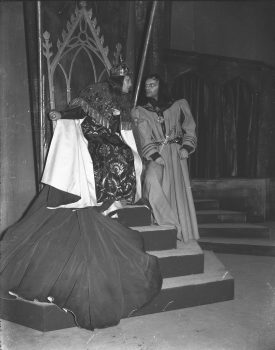The audience cheers and applauds virtually every turn, whistles break out among the crowd as they show their support. Meanwhile, on another night, a firecracker is thrown as the anger at a poor performance threatens to simmer over. Elsewhere, a riot ensues and the militia find themselves having to fire into the crowd to restrain the baying mob unhappy at a performance. Twenty-two die, many more are injured. Boos ring out and the crowd stamp their feet, hiss and yell. Meanwhile at another performance, there are so many watching that they overflow onto the stage. The crowd interfere as they stand up for the underdog and protect him from the fight, they race across the stage with the soldiers, abuse the villains.
A change in reception?
Lawrence Levine writes that this is how Shakespeare was received by its early 19th century audience in America. Today, as the literary canon takes hold, we all know of Shakespeare, of course we do, and being in Warwickshire we surely cannot avoid Shakespeare (it’s not just Stratford where references abound: for years Coventry branded itself as “the city in Shakespeare’s County”). Shakespeare’s place in English Literature, however, means that he is treated with a reverence and respect; he can be the sign of good taste. A way to demonstrate learning can be to quote the odd line from his play, but what you don’t generally do nowadays is correct the actors if they get it wrong. And we all like Shakespeare, right? Well they certainly did in 19th century America. There, Shakespeare was the popular entertainment. Different times, of course, but there he was the mainstream much as, maybe, Coronation Street might be to a British audience of a few years back.
The Death of the Author?
Roland Barthes wrote of the Death of the Author, but Shakespeare shows this is anything but. We can watch his plays in Stratford, the place of his birth, and Shakespeare himself becomes the signifier. Shakespeare is Englishness, class, good taste; the use of his name evokes a reaction and everyone will have a view of his work, whether they’ve watched a play or not. Mind you, throwing rotten fruit at the actors performing at the Royal Shakespeare Theatre would probably not go down well with my fellow spectators in the present day.
What do you think?
But we can’t throw Barthes out with the bathwater. It’s not just the texts and how they are performed that offer an insight into society and culture, but also how they are received. How do you watch Shakespeare, and what do you feel about his plays? How do you feel about Shakespeare and his place in Warwickshire? I’d really love to know.








Comments
It is fascinating that the idea of Shakespeare should have such a strong hold, while we know so little about the author as a person. Perhaps we are only able to idolise the individual because we don’t have evidence of their flaws and follies. It’s more like Carbonisation of the Author (yes, I am imagining Hans Shakespeare in Jaba the Hut’s basement…).
I have some glorious and some dire experiences of Shakespeare. The best was As You Like It at the RSC. It was so immersive it involved one of the actors busking in the street beforehand, and when we left the theatre the trees were strewn with poetry. My friends and I ended up dancing down the street with joy!
The worst was an outdoor performance of Twelfth Night by some very enthusiastic amateurs who did not quite understand most of the lines (except the innuendos, which they managed to find *everywhere* – very proper Shakespeare!). It was painful enough, even numbed by a bottle of mead, and I confess we were all relieved when the performance was rained off half way through…
Since then, I think I respect the actors/theatre more than the playwright. A good troupe can make poetry out of the shoddiest writing, and vice versa.
I agree with the idea that Shakespeare has become something much more than a Stratford-born playwright. Normally I enjoy connecting the author with the work, but strangely, with Shakespeare, I don’t tend to. His works simply exist themselves, almost independently. Perhaps I feel that way because I love the plays so much; they go beyond one man. I know it’s a little irrational, and that a better knowledge of the man, and historical context, would only further my comprehension of the plays. But the authorship isn’t clear-cut either; as we know he collaborated with others; so maybe it’s unwise to cast him as quite so flawless and omnipotent.
To write so much, and so much so beautifully, does suggest genius. But I reckon that it’s more reliable to praise the work for its own sake rather than for Shakespeare’s.
Strangely, I normally regard him as a London man, because that’s where he did most of his work and that’s where his plays were performed. It seems very weird to say that, especially now as Stratford and Shakespeare are almost synonymous. I know he was inspired by the Warwickshire countryside, places like the Forest of Arden and I’d like to read into that and find out how much of Warwickshire stayed with him.
At present, I mostly watch the @CBeebiesHQ versions of Dream and Tempest. And they are *really* well done. A bit bowdlerised but appropriately for the target audience, and a genius stroke using Shakespeare for exposition.
Add a comment about this page